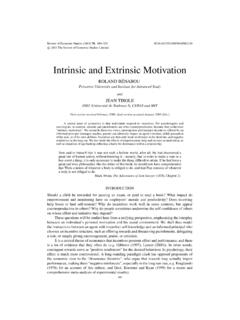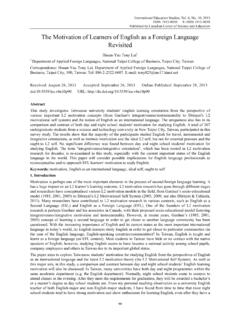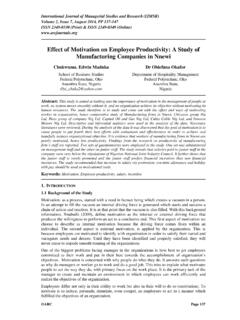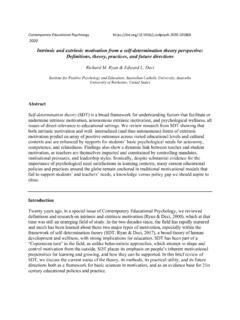Transcription of Andragogy and Motivation: An Examination of the Principles ...
1 4-3 Andragogy and motivation : An Examination of the Principles of Andragogy through Two motivation Theories Joseph Houde North Carolina State University Andragogy , originally proposed by Malcolm Knowles, has been criticized as an atheoretical model. Validation of Andragogy has been advocated by scholars, and this paper explores one method for that process. Current motivation theory, specifically socioemotional selectivity and self-determination theory correspond with aspects of Andragogy . In conjunction, these two theories could be used to test and validate the model. This paper explains the correspondence of the motivation theories with Andragogy and proposes a process for validation. Keywords: Andragogy , motivation , Adult Learner Malcolm Knowles Principles of Andragogy have been at the core of adult learning since the theory was put forward over 30 years ago.
2 In that time, both strong detractors and strong supporters have emerged. Detractors often point out the inconsistencies in the model ( Hartree, 1984) as a problem, while supporters recount the utility of the model as an overriding virtue. Knowles discusses Andragogy in the context of psychological theory (Knowles, Holton & Swanson, 1998) but relies on older theories, such as ones from Abraham Maslow, Kurt Lewin and Skinner. Using these models as anchors fuels the detractors from the post-modern camp that claim that Knowles model is an artifact from a mechanistic intellectual frame ( Grace, 1996). Connecting Andragogy to more recent psychological theories can resolve this concern. Recent research in psychology has by necessity been developed with a certain resistance to post-modern critiques.
3 Several factors contribute to this: thorough subject selection to avoid confounding results with race, age, gender or socioeconomic factors; an understanding of the post-modern Principles of dialectic discourse and sometimes an application of those Principles in development of theory; and a greater reliance on empirical research aided by more sophisticated statistics which enable difficult concepts to be analyzed. Although not making the research immune to criticism, these factors improve the robust nature of more recent psychological , with its focus on the individual and a concern about learning, teaching and adult development has many parallels with psychology. These parallels need to be narrowed down in order to discern which theory is relevant. Because Andragogy is concerned about learning, cognitive psychology is a relevant field.
4 Given that the context of Andragogy is the relationship between a learner and an educator, social psychological theories are relevant. The significance of adult learning contrasted with child- and adolescent learning makes developmental psychology relevant. However, one track of psychological research seems extremely pertinent to the andragogical model. This track has roots in cognitive psychology, social psychology and developmental psychology. The research track in question is motivation . The research in motivation corresponds to Andragogy in many ways. Most directly, Andragogy has motivation as one of its six Principles . Upon deeper Examination , motivation plays an implicit role in the other five Principles as well. In particular, two current theories provide insight into Andragogy and a potential for validating the model.
5 Self-determination theory is a needs-based theory that proposes an inherent growth drive centering on three core needs. Autonomy, competence and relatedness are all relevant o Andragogy . Socioemotional selectivity theory focuses on individuals relationship with time, goals and emotions. The core of this theory centers around the impact of age on choosing between goals focused on knowledge and goals focused on regulating emotions. This distinction is directly relevant to andragogogical paper will show that these two theories relate to Andragogy in a way that will enable closer Examination and validation of reviewing the literature and examining Andragogy through the lens of that literature, a point about the nature of Andragogy needs to be acknowledged. Andragogy is an atheoretical model and as such, is based on observation and experience, rather than logical postulates and/or empirical research.
6 This is, indeed, part of the model s vulnerability to critics. The intent of this review is to use theoretical support from the motivation literature to strengthen Andragogy . This can be seen as a first step in the process Davenport and Davenport (1985) suggest of resolving Andragogy through empirical testing, as much of the theory to be discussed has been empirically researched. Moreover, combining Davis and Davis s (1998) opinion of the benefit of a more theoretical field of Copyright 2006 Joseph Houde904-3human resources development and Brookfield s (1986) opinion that Andragogy is the most popular model in adult learning leads to the conclusion that connecting Andragogy to theory is an endeavor that can further the field of Human Resources Development. Theoretical Framework: motivation Theories and Andragogy Before looking at the individual Principles of Andragogy , one key facet of the model must be examined.
7 Underpinning the model of Andragogy is the idea that adult and children are different. This is a key supposition in dismissing pedagogy for Andragogy . Socioemotional selectivity has a method for delineating adults and children that is relevant to Andragogy . Socioemotional selectivity is concerned with the choice between differing types of goals. The factor that mediates the choice of one type of goal over the other is an individual s perspective on whether future time is constrained or expansive. This future time perspective is seen to vary with age: as a person grows older, time becomes more constrained because the reality of death becomes increasingly imminent. Therefore, an individual in their adolescent years is likely to have an expansive future time perspective, while the same individual in their old age will have a more constrained future time perspective (Carstensen 1987, 1991).
8 However, future time perspective is not seen to co-vary with age as time from birth but rather co-varies with age more appropriately as proximity to death . A study by Carstensen and Fredrickson (1998) illustrate this principle: HIV positive individuals tended to react in the same manner as senior citizens. Socioemotional selectivity and self-determination theory each lend perspective core Principles of the model of Andragogy . Currently, there are six core Principles of Andragogy expressed by Knowles, et al. (1998). Four were originally proposed and the other two were added more recently in 1980 and 1999. The Principles of Andragogy are described as important assumptions about adult learners (Knowles, 1980). As mentioned earlier, one of these Principles refers directly to the motivation of adult learners. Although the Principles are consistently presented in a precise order, with one of the newer Principles added to the beginning of the list and one added to the end, no explicit reason for the order is given, and the Principles each have an internal integrity that suggest they can stand in any order and not lose their intended meaning.
9 With this in mind, the Examination of Andragogy will start with the principle of motivation , as motivation theory is most clearly pertinent to it. Afterwards, the conventional order as presented by Knowles, et al. (1998) will be followed. Due to the confusion and potential misinterpretation that can accompany one-line summations of the Principles of Andragogy , (as discussed in Swanson and Holton, 2001) From this point, the Principles will be referred to by either the number or italicized reference for them in Knowles, et al.(1999). motivation The sixth principle of Andragogy relates to motivation . The assumption about adult learners in this principle is that while adults are responsive to some external motivators (better jobs, promotions, higher salaries, and the like) the most potent motivators are internal pressures (the desire for increased job satisfaction, self-esteem, quality of life, and the like).
10 (Knowles, et. al., 1998, p. 68) This straightforward assumption is readily supported by self-determination theory. Self-determination theory has been developed by Deci and Ryan as a model for understanding human motivation (1985, 1991, 2000; Ryan, 1993, 1995). Self-determination theory states that individuals have a basic drive toward growth as humans and that the needs for autonomy, relatedness, and competence are at the core of this drive. These three basic human needs of self-determination theory are intrinsic needs. Reviews of intrinsic motivation research (Deci & Ryan, 1985; Koestner & McClelland, 1990) articulate some general Principles regarding the facilitation of internally motivated behaviors. Numerous studies have shown that these behaviors are most likely to occur under conditions that support perceived competence, such as challenging contexts and positive feedback, as well as those that support perceived autonomy, such as opportunities for choice and the absence of external rewards or controls.

















